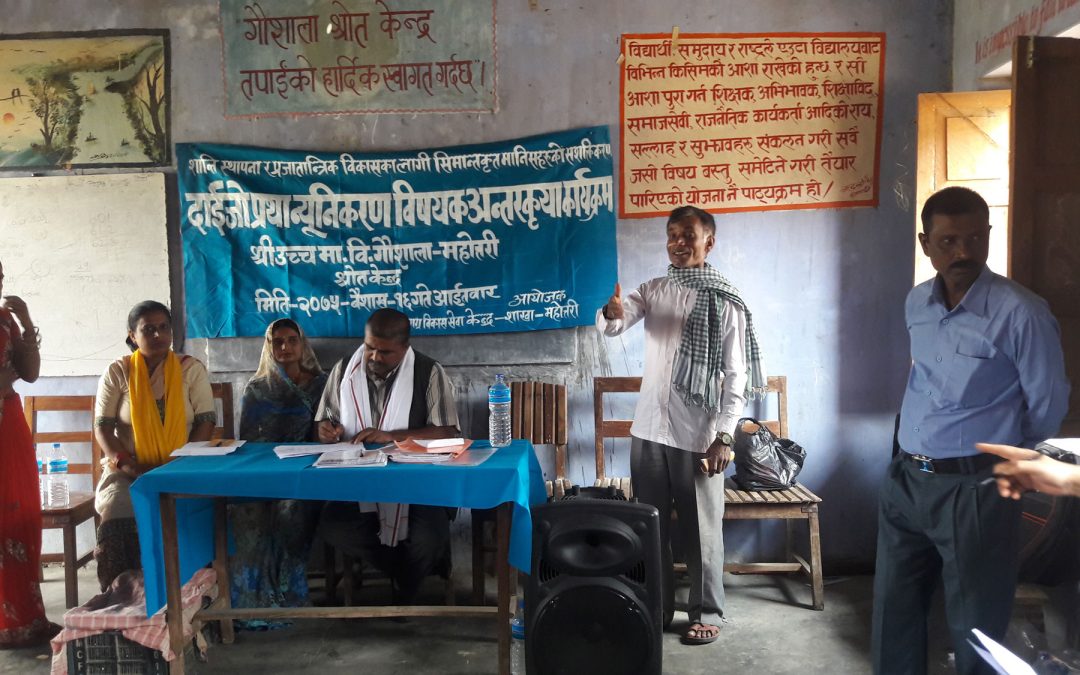Though Dowry Prohibition Act is already in place to eradicate ill practice of dowry system, it is still deeply rooted in Terai regions and has tortured woman both physically and mentally. Laws, dowry act, rules and regulation related to dowry system is fragile in terms of implementation due to poor attitude and lack of awareness among people. To address this vital issue, interactive advocacy meeting against dowry system was held with presence of Chief of rural municipality, Deputy Chief of rural municipality, Head of Administrative office, ward chiefs, head of police office, representatives of Woman Development Office, SF members and SAMAGRA staffs in Koshi rural municipality in Sunsari on 12th Chaitra, 2074.
The participants expressed their sufferings and sought solution from concerned authority. Akali Devi Sada, Dalit Woman Member, Koshi rural municipality-5 said, “Guests came from Maina Kaderi with marriage proposal for my daughter. After the proposal was accepted, the groom side demanded four hundred thousand rupees but we could not afford such a huge amount therefore we bargained for hundred fifty thousand rupees instead. After hearing this, the groom side made an excuse saying that the marriage will be final only when a groom’s maternal uncle will meet our daughter. We have not heard from them from that date.”Suleman Mansuri, Ward Chief-3 said, “Compared to men, women are seen more demanding as they view dowry as social prestige. Women are quite competitive when it comes to taking dowry which has increased the practice.
Raj Kumari Shah, Ward Chief, Koshi rural municipality-1 noted lack of education and awareness as major causes of dowry practice and suggested girls education and awareness programs to overcome this social problem. Similarly Ashok Shah, Chief Administrative Officer, Koshi Rural municipality suggested to announce Koshi rural municipality, a dowry free zone and legal punishment to both the parties giving and taking dowry. He further raised a serious issue, “Though we have been saying that by educating daughters’ dowry system can be eradicated, the story is different in reality. More the girl is educated, higher is the demand for dowry as we match our daughter’s education with her home to be. If we reject to do so, marriage of daughter is impossible.” He expressed his commitment to make his daughter skillful and independent and marry off her with rather poor boy but the educated one without giving a rupee as a dowry.
As a result of this advocacy meeting, chief of Koshi rural municipality announced to make Koshi rural municipality dowry free zone and suggested participants to give social pressure to those taking dowry as their protest to this system. For example- not attending wedding function which has promoted dowry system, excluding them in social programs, raising awareness through road drama, rally, etc. As a personal commitment, the deputy chief of the municipality declared that she would not take any dowry in his son’s wedding. Further, the participants were encouraged to collect evidence of such activities which shall ease in taking legal action as on when required and make the implementation part stronger.
SAMAGRA organizes such programs to draw attention of policy makers for policy reform and refresh already in place polices for proper implementation. Similar interactive session against dowry system was held on Gaushala,Mahottari on 17th Baisakh, 2075.

